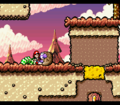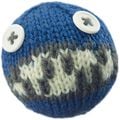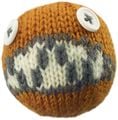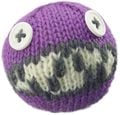Chomp Rock: Difference between revisions
| Line 74: | Line 74: | ||
|DutM=Chomp Rock | |DutM=Chomp Rock | ||
|Por=Pedra Dentada | |Por=Pedra Dentada | ||
|PorM= | |PorM=Toothed Stone | ||
|Kor=멍멍이돌 | |Kor=멍멍이돌 | ||
|KorR=Meongmeong'i'dol | |KorR=Meongmeong'i'dol | ||
Revision as of 17:01, March 14, 2021
- Not to be confused with Stone Chomp.
Template:Item-infobox Chomp Rocks, also known as Romp Chomps[1], are round stones that look like Chain Chomp heads. They appear primarily in the Yoshi series.
History
Yoshi franchise
Super Mario World 2: Yoshi's Island
Chomp Rocks first appear in Super Mario World 2: Yoshi's Island as a common object. They are generally used for moving through soft rock and reaching high areas, but in some levels, they are an obstacle, such as when they need to be rolled off a thin pillar to reach a key. Some Sluggers hit these back and forth. Yoshi can push Chomp Rocks forward or jump on top of them to roll them in any direction. He can use Chomp Rocks to crush most enemies, even otherwise-invulnerable foes, such as a Tap-Tap. The Cave Of Chomp Rock is themed after them.
Chomp Rocks come in gray and brown in this game, the difference being that the gray ones will respawn at their starting point if the player leaves the screen and comes back, while the brown ones will not.
Yoshi's Island DS
Chomp Rocks appear in Yoshi's Island DS unchanged from the previous game except for the fact that neither color respawns, except for the one in the Island Museum's Land Enemy section - which happens to be brown.
Yoshi's New Island
Chomp Rocks appear in Yoshi's New Island, unchanged from the previous game. Data indicates that snowballs are retextured Chomp Rocks.[2]
Yoshi's Woolly World
Chomp Rocks reappear in Yoshi's Woolly World, acting the same as in previous Yoshi games.[3] In this game, they resemble amigurumi crochet spheres that come in many different color variations with white buttons for eyes. Frame Chomps can be turned into a Chomp Rock if Yoshi throws a yarn ball at one. The color of the Chomp Rock is determined by the color of yarn used.
Other appearances
Chomp Rocks appear in Paper Mario as background objects in Dry Dry Ruins, and resemble the living Stone Chomps. They are also seen outside the Dry Dry Ruins, on decorative pedestals surrounding the outside. Paper Mario's Chomp Rocks have slightly gaping mouths.
Two Chomp Rocks appear in Paper Mario: The Thousand-Year Door in the Palace of Shadow's Riddle Tower area, blocking the pipes that Mario needs to unlock the tower. Actual Chain-Chomps guard the pipes. In this incarnation, the rocks are hollow and have open mouths. Mario can destroy the rocks by throwing Admiral Bobbery into the gaping maws of the rocks. When Bobbery explodes, the rock is destroyed.
Brown Chomp Rocks make an appearance in Mario & Luigi: Partners in Time, where the Yoshis are needed to move them on two occasions to open up new paths in Yoob's Belly. Five Yoshis can also use a Chomp Rock to lower Sunnycide's defense after the Bros. free them from Yoob eggs.
In the Club Nintendo comic "Mario's Picross", Mario gets arrested inside of a pyramid. He comes across a treasure chamber with a chest inside. When trying to pick up the treasure chest, a Chomp Rock is released through a trap door and starts rolling towards Mario. He escapes from the rock by jumping into a lorry and moving away.
Gallery
Yoshi pushing a red Chomp Rock
Names in other languages
| Language | Name | Meaning | Notes |
|---|---|---|---|
| Japanese | ワンワン岩[4] Wanwan Iwa |
Chomp Rock | |
| Chinese | 汪汪石[?] Wāngwāng Shí |
Chain Chomp Rock | |
| Dutch | Chomp-steen[?] | Chomp Rock | |
| German | Big Chomp[?] | Big Chomp | |
| Italian | Masso Tritatutto[?] | Grinder Rock | |
| Korean | 멍멍이돌[?] Meongmeong'i'dol |
Chain Chomp Rock | |
| Portuguese | Pedra Dentada[?] | Toothed Stone | |
| Russian | Кусалковалун[?] Kusalkovalun |
Chomp Boulder | |
| Spanish | Roca Chomp[?] | Chomp Rock |
References
- ^ Black, Fletcher. Yoshi's Island DS PRIMA Official Game Guide. Page 16.
- ^ Image showcasing the retextured Chomp Rock.
- ^ https://www.youtube.com/watch?v=caS_eSIKIj0
- ^ 「スーパーマリオアドバンス3任天堂公式ガイドブック」 (Super Mario Advance 3 Nintendo Kōshiki Guidebook), page 9.
| Chain Chomps | |
|---|---|
| Characters | Broode's Chain Chomp • Chomp Country • Kyankyan • Paper Macho Chain Chomp • Princess (Paper Mario: Color Splash) • Princess (Paper Mario: The Origami King) • The Big Chomp and the Little Chomp • Underchomp |
| Species | Big Chain Chomp • C. Chain Chomp • Chain Chawful • Chain Chomp • Chain Chomplet • Chaindelier • Chomp (stomping) • Chomp Chomp • Chomp-Muncher • Dark Chomp • Fire Wanwan Dosun • Frame Chomp • Gold Chomp • Homing Chomp • Incoming Chomp • Mecha-Chomp • Paper Chain Chomp • Red Chomp • Small Chomp • Spiked Chomp • Stone Chomp • Wonder Chomp |
| Relatives | Flame Chomp • Flame thrower |
| Other | Chomp Rock • Fake Chomp |

















